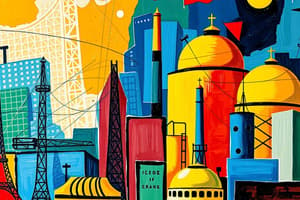Podcast
Questions and Answers
What is one of the primary purposes of economic activity?
What is one of the primary purposes of economic activity?
- To regulate government spending
- To eliminate unemployment
- To minimize production costs
- To meet human needs and wants (correct)
How is material living standards primarily measured?
How is material living standards primarily measured?
- OECD Better Life Index
- Gross Domestic Product (GDP) (correct)
- Happy Planet Index
- Human Development Index (HDI)
What does the Human Development Index (HDI) incorporate in its measurement?
What does the Human Development Index (HDI) incorporate in its measurement?
- Unemployment rates and inflation
- Access to resources and material wealth
- Environmental quality and economic growth
- Life expectancy, education, and per capita income (correct)
During which stage of the business cycle does economic activity slow and unemployment rise?
During which stage of the business cycle does economic activity slow and unemployment rise?
What is the primary function of the OECD Better Life Index?
What is the primary function of the OECD Better Life Index?
Which of the following aspects does economic activity NOT directly impact?
Which of the following aspects does economic activity NOT directly impact?
What characterizes the peak stage of the business cycle?
What characterizes the peak stage of the business cycle?
Which measurement primarily reflects an individual’s average income in a country?
Which measurement primarily reflects an individual’s average income in a country?
What does the trough in the economic cycle signify?
What does the trough in the economic cycle signify?
Which of the following accurately describes leakages in an economy?
Which of the following accurately describes leakages in an economy?
Which sector is responsible for producing goods and services in the five-sector model?
Which sector is responsible for producing goods and services in the five-sector model?
What is the primary goal of sustainable economic growth?
What is the primary goal of sustainable economic growth?
What is an example of a leading economic indicator?
What is an example of a leading economic indicator?
In the formula for Aggregate Demand (AD), what does 'I' represent?
In the formula for Aggregate Demand (AD), what does 'I' represent?
Which of the following can be classified as a non-financial economic indicator?
Which of the following can be classified as a non-financial economic indicator?
What is the primary function of the Financial Sector in the economy?
What is the primary function of the Financial Sector in the economy?
Flashcards are hidden until you start studying
Study Notes
Economic Activity
- Is the total production, consumption, and income in an economy
- Satisfies basic needs and wants
- Creates jobs and improves living standards
- Drives economic growth
Material and Non-Material Living Standards
- Material living standards measure access to goods and services, impacting quality of life
- Measured by GDP and GDP per capita
- Non-material living standards consider factors beyond physical wealth, like health, environment, and work-life balance
- Measured by indicators like the OECD Better Life Index, Human Development Index (HDI), and Happy Planet Index
Business Cycle
- Represents fluctuations in economic activity over time
- Features periods of expansion and contraction
- Stages:
- Expansion: Growth increases, unemployment falls, production rises
- Peak: Economy reaches maximum output, inflation may rise
- Contraction: Activity slows, unemployment rises, production declines
- Trough: Lowest point of the cycle, marking the end of a recession
Five-Sector Model of the Economy
- Illustrates the interdependence of sectors in an economy
- Sectors:
- Household: Provides labor, consumes goods and services
- Business: Produces goods and services, pays wages
- Government: Collects taxes, provides public services
- Financial: Offers savings and investments
- Overseas: Handles imports and exports
- Leakages: Money flows out of the economy (e.g., taxes, savings, imports)
- Injections: Money flows into the economy (e.g., government spending, investments, exports)
Economic Growth
- Defined as an increase in real GDP, reflecting increased production capacity
- Driven by economic activities like production, investment, and consumption
- Sustainable economic growth: aims for:
- Low and stable inflation (around 2%)
- Low unemployment (3-4% range)
- Efficient resource use
Economic Indicators
- Provide insights into current and future economic conditions
- Financial Indicators: Measure economic performance
- GDP, GDP per capita, household income, consumer price index (CPI), inflation rate
- Non-Financial Indicators: Reflect social and economic wellbeing
- Unemployment rate, literacy, average work hours, crime rates
- Leading indicators: Predict future trends, such as consumer/business confidence
- Lagging indicators: Confirm past trends, like inflation and unemployment rates
- Coincident indicators: Reflect the current economic state, moving with the business cycle
Economic Models (AD/AS)
- Aggregate Demand (AD): Total spending on goods and services in an economy
- Formula: AD = C + I + G + (X - M), where:
- C: Consumption
- I: Investment
- G: Government spending
- X: Exports
- M: Imports
- An increase in any component boosts AD and economic activity
- Formula: AD = C + I + G + (X - M), where:
- Aggregate Supply (AS): Total goods and services firms are willing to produce at different price levels
- Short-run AS: Affected by factors like labor, capital, and technology
- Long-run AS: Determined by an economy's production capacity
Studying That Suits You
Use AI to generate personalized quizzes and flashcards to suit your learning preferences.




